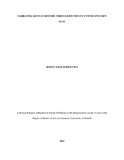| dc.description.abstract | Focusing on the intersection of history and fiction in Yvonne Owuor’s Dust (2014), this study
discusses narration of Kenyan history through fiction by examining ‘fictionalised history.’ The
study contends that fictionalised history challenges the publicly prevailing and dominant notions
about a nation and provokes conversations and engagement with the ignored ‘other’ facets of the
nation’s history. This is because fiction recollects past events and leaves one free to explore
alternative stories untold in official history, particularly in the process of nation-state formation,
but which the writer may re-call. Since fiction is significant in recollecting and re-interpreting
past realities to make sense of the intricate events in a nation-state, Owuor fictionalises history to
narrate stories on the margin of the Kenyan nation-state. By doing so, Owuor evokes the Kenyan
past and mirrors the historical events to challenge public prevailing notions about the nation-state
and reveal ignored facets of history based on violence, assassinations, corruption, nationalism
and disillusionment. Therefore, this study argues that Dust underscores what official history
suppresses, that is, the marginal ‘other’ personal stories that form part of the nation-state history.
Owuor relies not only on facts but also on imagination to create a story that readers can relate to
because it fills in the historical gaps in recorded historical realities in official history. | en_US |

